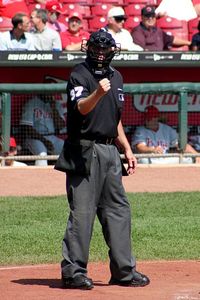 In his book, A Game of Inches, Peter Morris discusses the evolution of judgment calls by the umpire in the game of baseball. Morris explains how from the early 1850s to the 1870s, the role of the umpire in the game changed. In the early days, the umpire was called upon to make a decision only when the team's appealed to him. The players were expected to make the correct calls themselves and the umpire was there only to mediate an argument between the two sides. As the game developed and competitiveness and cheating crept into it, the umpire was called upon more and more to make the call.
In his book, A Game of Inches, Peter Morris discusses the evolution of judgment calls by the umpire in the game of baseball. Morris explains how from the early 1850s to the 1870s, the role of the umpire in the game changed. In the early days, the umpire was called upon to make a decision only when the team's appealed to him. The players were expected to make the correct calls themselves and the umpire was there only to mediate an argument between the two sides. As the game developed and competitiveness and cheating crept into it, the umpire was called upon more and more to make the call.By the 1860s, the umpires were calling more, but not much. For example, an umpire only called a ball foul, but never said if it was fair or not. So if a runner mistakenly thought the ball was foul, it was not the umpire's duty to inform him it was fair. Baseball writer and one of the main spokesman of the game in the mid 1800s, Henry Chadwick, described the amount of judgment calls an umpire was forced to make by the late 1860s, "The constant cry of judgment call...Has become a nuisance...There should be one spokesman in a nine and he should be the captain, and no captain...Will make appeals on points of play which it is the duty of the umpire to decide without any appeal, such as calling balks, balls, and strikes." (The Ball Player's Chronicle, July 11, 1867, taken from Morris, A Game of Inches). By the 1870s, the umpire was called upon to make a ruling on every play.
However, the idea that an umpire only makes a call on plays when appealed to has not disappeared from baseball altogether. In today's game there are three times when an umpire does not make the call unless appealed to. A batsman hitting out of order, a base runner failing to touch a base, and a player leaving a base too soon when tagging up for a sacrifice fly. Also, the umpire or the player may appeal on a checked swing.
In today's game, the umpires are relied upon for every call. If the umpire was not making a judgment, cheating would be rampant in the game and it would not be played fairly, which has always been an important theme in baseball. In the early days baseball players considered in manly and the correct thing to do to make the right call themselves. Now it has become so competitive and worth so much money, that no player would ever call himself out if the umpire made the wrong call. In the early days of baseball, it was considered dishonorable and against the game to not make the call. The game has certainly changed since the 1850s.

No comments:
Post a Comment